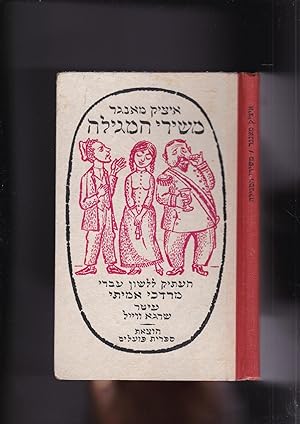Descripción
In Hebrew. Translation of Megile Lider. 103 pages. 216 x 136 mm. Itzik Manger (30 May 1901, Czernowitz, then Austrian-Hungarian Empire, later Romania and now in the Ukraine - 21 February 1969, Gedera, Israel) was a prominent Yiddish poet and playwright. His father, Hillel Manger, was a skilled tailor who loved literature, which he referred to as 'literatoyreh' (a portmanteau of the Yiddish words literatura and Toyreh). Manger attended the Kaiser Königlicher Dritter Staats-Gymnasium, where he studied German literature until he was expelled for pranks and bad behavior. Thereafter his education was at the Yiddish theatre's backstage. In 1921, Manger began publishing his early poems and ballads in several new literary journals founded in the aftermath of World War I. Soon afterwards, he settled in Bucharest and wrote for the local Yiddish newspapers while giving occasional lectures on Spanish, Romanian, and Gypsy folklore. In 1927, Manger came to Warsaw, the spiritual and intellectual center of Ashkenazi Jewry and remained there for the next decade, which became the most productive period of his entire career. In 1929, Manger published his first book of poetry, Shtern afn dakh (Stars on the Roof) to critical acclaim. He became famous. Between 1929 and 1938 he gave frequent readings of his own poetry at the Writers' Club, was interviewed by all the major Warsaw Yiddish papers, published articles in the prestigious journal Literarishe Bleter (Literary Pages), issued his own literary journal called Chosen Words filled with his poetry, fiction, and artistic manifestos. At the same time, Manger continued to publish his own works, including a series of modernist poems inspired by the Oral Torah, a series of fictional vignettes on the history of Yiddish literature and three more volumes of poetry. His works secured Manger his international reputation. With widespread anti-Semitism in the highest levels of Polish government and society, Jewish life in Warsaw became increasingly dire, so Manger left for Paris in 1938. But Paris was not safe for long. In 1940 he fled to Marseilles, Tunis, and then to Liverpool, and finally moved to London. He became a British citizen and remained there, unhappily, for 11 eleven years. Disillusioned and unproductive, Manger immigrated to Israel in 1958, and he remained there until his death. In Israel he achieved success. In 1965, Dov Seltzer directed a highly popular production of Manger's Songs of the Megillah which set a record in Israeli theatre with 400+ performances. When he died in 1969, Manger was mourned as an Israeli national poet. Romanian Jewish playwright Israil Bercovici adapted a collection of Manger's poems into a two-act stage piece, Mangheriada, which premiered 6 April 1968 at the Romanian State Jewish Theater in Bucharest. Manger's poem "Oyfn veg shteyt a boym" has been set to music and has entered the repertoire of Yiddish song. . . N° de ref. del artículo 011834
Contactar al vendedor
Denunciar este artículo
Detalles bibliográficos
Título: Mishirey HaMegila
Editorial: Sifriat Poalim - Workers Book-Guild (Hashomer Hatzair), Merhavia, Israel
Año de publicación: 1953
Encuadernación: Hardcover
Ilustrador: Weill, Shraga
Condición: Very Good
Condición de la sobrecubierta: No Jacket
![]()




